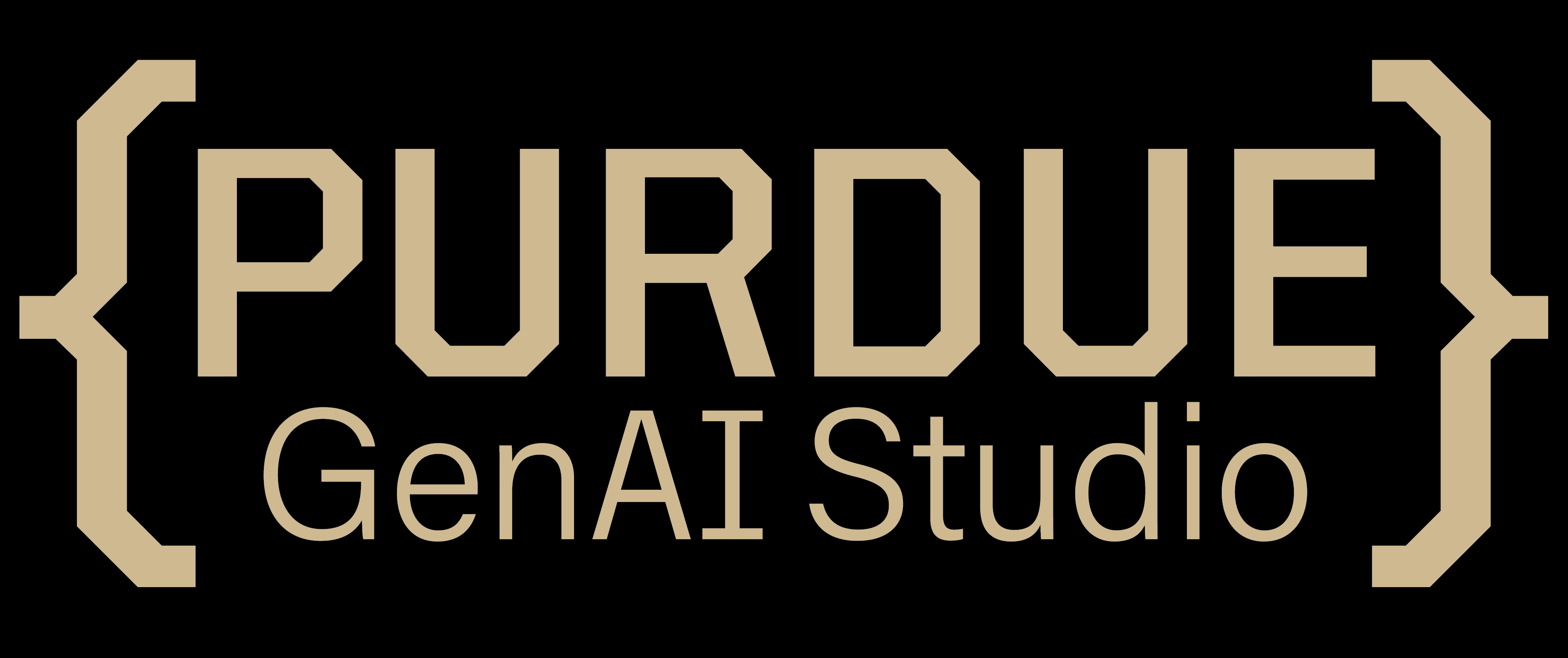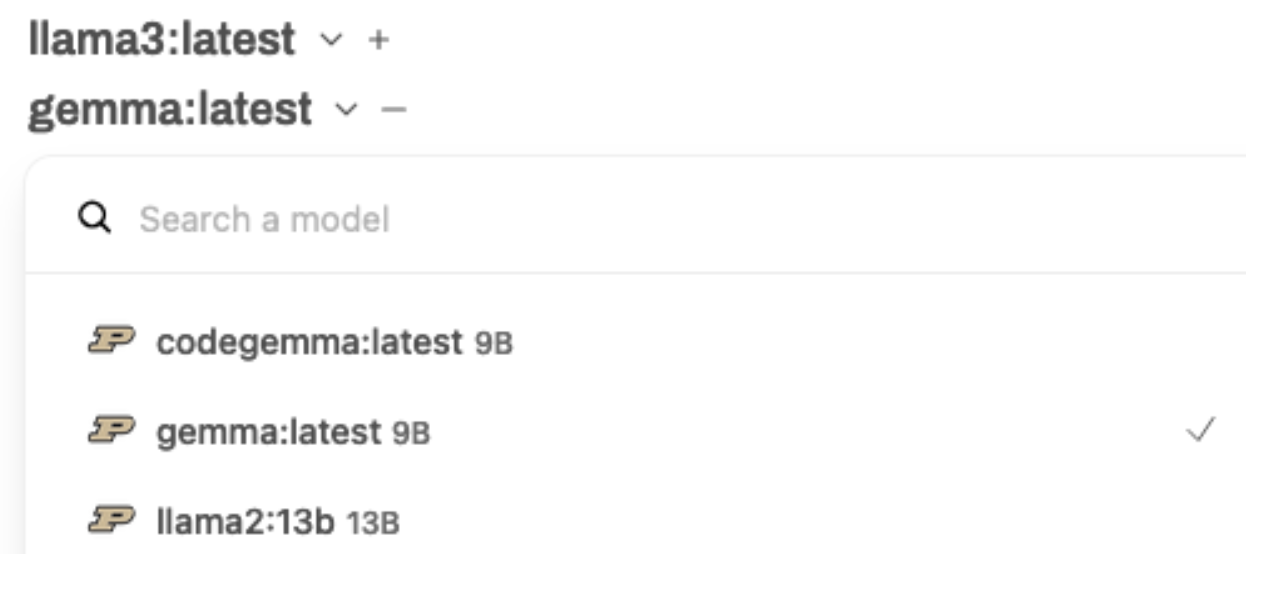Purdue GenAI Studio, Purdue’s powerful new LLM service, now available
In collaboration with the Institute for Physical AI (IPAI), Purdue University’s Rosen Center for Advanced Computing (RCAC) now offers a powerful new feature in its artificial intelligence software services—Purdue GenAI Studio. Purdue GenAI Studio is a large language model (LLM) service that makes open-source LLM models like LLaMA accessible to anyone at Purdue. Unlike other LLM services, Purdue GenAI Studio is hosted entirely on-premises using resources within Purdue’s community cluster supercomputers. This means researchers have more democratized access to LLMs, as well as more control. And the best part? During its pilot stage, Purdue GenAI is free to use.
Purdue GenAI Studio is  an evolution of AnvilGPT, an LLM studio system based on the Anvil system from the National Science Foundation’s ACCESS program. AnvilGPT was developed to assist researchers nationwide. The intent behind the tool was to provide an LLM service that researchers could easily access and use, and which negates the concern of leaking intellectual property or proprietary data. Since its launch earlier this year, AnvilGPT has been a tremendous success, garnering lots of attention and eliciting a higher-than-expected utilization rate. Due to this overwhelmingly positive response, the team at RCAC decided to create a similar tool that could be used by anyone at Purdue, not just ACCESS researchers. Thus, Purdue GenAI Studio was born.
an evolution of AnvilGPT, an LLM studio system based on the Anvil system from the National Science Foundation’s ACCESS program. AnvilGPT was developed to assist researchers nationwide. The intent behind the tool was to provide an LLM service that researchers could easily access and use, and which negates the concern of leaking intellectual property or proprietary data. Since its launch earlier this year, AnvilGPT has been a tremendous success, garnering lots of attention and eliciting a higher-than-expected utilization rate. Due to this overwhelmingly positive response, the team at RCAC decided to create a similar tool that could be used by anyone at Purdue, not just ACCESS researchers. Thus, Purdue GenAI Studio was born.
Purdue GenAI Studio is hosted entirely on-premises, meaning no documents or contexts are uploaded into commercial cloud-hosted AI services. Chats, documents, and models are also not shared between users or used for training. Not only will users feel more secure in their work, but researchers will also be able to use Purdue GenAI Studio for grant-funded work that specifically limits the transfer of data to third-party services.
“Purdue GenAI Studio is great in that it is all hosted on our servers, and utilizes the new GPUs being added to support Purdue Computes,” says Sarah Rodenbeck, a Lead Research Data Scientist at RCAC and product lead of Purdue GenAI Studio. “Nothing is going to be used for further training of models or shared between groups, so researchers can be more comfortable uploading documents that may contain proprietary content or have restrictions on use.”
Another benefit RCAC wanted to provide was democratized access to the LLM service. As such, Purdue GenAI Studio is currently available to all Purdue users at no cost. Among the benefits mentioned above, this also saves researchers from having to pay for commercial subscriptions. And since it is hosted on Purdue systems managed by RCAC, researchers don’t need to set it up on their personal computers or laptops, giving them better functionality with more powerful results.
Purdue GenAI Studio’s  user interface (UI) is intuitive and easy to use. There are two modalities for interacting with Purdue GenAI Studio—both the UI and API,—and additional functionality for both is under active development. The chat interface allows researchers to select from a list of models, including both base models (available to all users) as well as any custom models the individual researcher may have created. Users may also select multiple models to compare the output for any prompt. Additional open-sourced models that are not already listed can be added to Purdue GenAI Studio upon request. Users can also take advantage of the tool’s Retrieval-Augmented Generation (RAG) functionality. RAG functionality allows researchers to upload their own data into the model, providing it with more context. This adds to the model’s base knowledge, which helps it to provide more accurate responses in particular domains. However, GenAI Studio should not be used with University data classified as sensitive or restricted.
user interface (UI) is intuitive and easy to use. There are two modalities for interacting with Purdue GenAI Studio—both the UI and API,—and additional functionality for both is under active development. The chat interface allows researchers to select from a list of models, including both base models (available to all users) as well as any custom models the individual researcher may have created. Users may also select multiple models to compare the output for any prompt. Additional open-sourced models that are not already listed can be added to Purdue GenAI Studio upon request. Users can also take advantage of the tool’s Retrieval-Augmented Generation (RAG) functionality. RAG functionality allows researchers to upload their own data into the model, providing it with more context. This adds to the model’s base knowledge, which helps it to provide more accurate responses in particular domains. However, GenAI Studio should not be used with University data classified as sensitive or restricted.
Purdue GenAI Studio is yet another innovation stemming from Purdue’s persistent pursuit of excellence within the field of artificial intelligence. The release of Purdue GenAI Studio will provide another tool to bolster the Purdue Computes initiative, and was made possible thanks to the support of the Institute for Physical AI (IPAI). Purdue users can request access to Purdue GenAI Studio here: https://genai.rcac.purdue.edu
The User Guide for Purdue GenAI Studio can be found here: https://www.rcac.purdue.edu/knowledge/genaistudio
If you have questions or require troubleshooting assistance, please contact rcac-help@purdue.edu.
Written by: Jonathan Poole, poole43@purdue.edu
